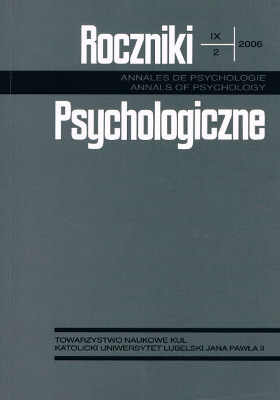Human values accounting for materialistic orientation
Abstract
The aim of research was to investigate relationships between human values and materialistic orientation. Two-hundred-fifty-two subjects were surveyed: 109 males and 143 females, aged 24 to 46, with secondary education and university degree. The followingmethods were used: Materialistic Orientation Scale inspired by Richins and Dawson’s theory, and Rokeach Value Survey. Multiple linear regression analysis was applied. It was found out that human values were linked with materialistic orientation and explained 29% of its variance. Materialistic orientation correlated positively with comfortable life and negatively with wisdom, inner harmony and loving. Multiple regression analysis showed that human values explained 34% of variance in materialistic orientation in the group of females and 21% in the group of males. Moreover, materialistic orientation is linked with wisdom and inner harmony of women, whereas it was not linked with the above values in males. Multiple regression analysis showed that human values explained 31% of variance in materialistic orientation in subjects aged 24 to 35, and 34% in subjects aged 36 to 46. Materialistic orientation was positively linked with such values as ‘peace in the world’, ‘happiness’ and ‘broad- -mindedness in subjects aged 24 to 35, whereas it was positively linked with an ‘exciting life’ and ‘ambition’ in subjects aged 36 to 46. Other instrumental values were found to be linked with materialistic orientation both in females and males, and in age groups 24 to 35 and 36 to 46.
References
Brzezińska, A. (2000). Społeczna psychologia rozwoju. Warszawa: Wydawnictwo Naukowe Scholar.
Brzozowski, P. (1989/1996). Skala Wartości (SW). Polska adaptacja Value Survey M. Rokeacha. Warszawa: Pracownia Testów Psychologicznych Polskiego Towarzystwa Psychologicznego.
Burroughs, J. E., Rindfleisch, A. (2002). Materialism and well-being: Conflicting values perspective. Journal of Consumer Psychology, 29, 348-370.
Chiagouris, L., Mitchell, L. E. (1997). The new materialists. W: L. R. Kahle, L. Chiagouris (red.), Values, lifestyle and psychographics (s. 263-281). Mahwah: Lawrence Erlbaum Associates.
Czapiński, J. (2004). Psychologiczne teorie szczęścia. W: J. Czapiński (red.), Psychologia pozytywna. Nauka o szczęściu, zdrowiu, sile i cnotach człowieka (s. 51-102). Warszawa: Wydawnictwo Naukowe PWN.
Fourier, S., Richins, M. L. (1991). Some theoretical and popular notions concerning materialism. Journal of Social Behaviour and Personality, 6, 403- 414.
Górnik-Durose, M. (2002). Psychologiczne aspekty posiadania – między instrumentalnością a społeczną użytecznością dóbr. Katowice: Wydawnictwo Uniwersytetu Śląskiego.
Graham, J. F. (1999). Materialism and consumer behaviour: Toward a clearer understanding. Journal of Social Behaviour and Personality, 14, 241-256.
Inglehart, R. (1990). Culture shift in advanced industrial society. Princeton, NJ: Princeton University Press.
Kahle, L. R., Beatty, S. E., Homer, P. (1986). Alternative measurement approaches to consumer values: The List of Values (LOV) and Values and Life Style (VALS). Journal of Consumer Research, 13, 405-409.
Kasser, T., Ryan, R. M. (1996). Further examining the American dream: Differential correlates of intrinsic and extrinsic goals. Personality and Social Psychology Bulletin, 22, 280-287.
Keng, K. A., Kwon, J., Tan, S. J., Wirtz, J. (2000). The influence of materialistic inclination on values, life satisfaction, and aspirations: An empirical analysis. Social Indicators Research, 49, 317-333.
Król, G., Wieczorkowska, G. (2004). Budowanie wskaźników za pomocą analizy czynnikowej. W: J. Brzeziński (red.), Metodologia badań psychologicznych. Wybór tekstów (s. 391-416). Warszawa: Wydawnictwo PWN.
Micken, K. S. (1993). Materialism and the self. Dissertation Abstracts International, 54-10A, 3813-4074.
Richins, M. L. (1991). Social comparison and the idealised images of advertising. Journal of Consumer Research, 18, 71-83.
Richins, M. L. (2004). The material value scale: Measurement properties and development of short form. Journal of Consumer Research, 31, 209-219.
Richins, M. L., Dawson, S. (1992). A consumer values orientation and its measurement: Scale Development and Validation. Journal of Consumer Research, 19, 303-317.
Richins, M. L., Rudmin, F. W. (1994). Materialism and economic psychology. Journal of Economic Psychology, 15, 217-231.
Rokeach, M. (1973). The nature of human values. New York: Free Press.
Ryff, D. C., Keyes, C. L. M. (1995). The structure of psychological well-being revised. Journal of Personality and Social Psychology, 69, 719-727.
Schmuck, P., Kasser, T., Ryan, R. M. (2000). Intrinsic and extrinsic goals: Their structure and relationship to well-being in German and US college students. Social Indicator Research, 50, 225-241.
Schudson, M. (1991). Delectable materialism: Where the critics of consumer culture wrong all along. American Prospect, 2, 26-35.
Seligman, M. E. (2004). Psychologia pozytywna. W: J. Czapiński (red.), Psychologia pozytywna. Nauka o szczęściu, zdrowiu, sile i cnotach człowieka (s. 18-32). Warszawa: PWN.
Zakrzewska, M. (2004). Konfirmacyjna analiza czynnikowa w ujęciu pakietu statystycznego LISREL 8.51 (2001) Karla G. Joreskoga i Daga Sorboma. W: J. Brzeziński (red.), Metodologia badań psychologicznych. Wybór tekstów (s. 391-416). Warszawa: Wydawnictwo Naukowe PWN.
Copyright (c) 2006 Roczniki Psychologiczne

This work is licensed under a Creative Commons Attribution-NonCommercial-NoDerivatives 4.0 International License.


